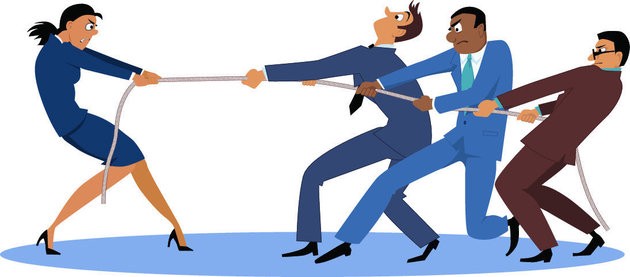
As the COVID-19 ‘lockdown’ is being gradually eased all over the world, we hesitantly emerge from our home-confinement with blinking eyes kitted out with home-made masks, clutching almost-empty sanitizer bottles, sporting bad haircuts that make hairdressers rub their hands in anticipation, wondering what the future holds for us. We are simultaneously anxious, excited, fearful and hopeful.
Instinctively, we know our lives are going to change in more ways than we could fathom. Having had plenty of time to rethink and contemplate our pre-pandemic approach to work and life, some of the changes will be self-applied. Other changes will be imposed upon us by authorities, employers and collective new social code yet to be clearly defined.
One of the many aspects of our lives to be tested and put under pressure is the potential retrograde step in the dynamic between men and women in the workplace and at home.
Statistics are indicating that during the lockdown, and as economies shrink spectacularly, more women are losing their jobs than men, or at best, are offered part-time contracts. When scrutiny by the various watchdogs who are otherwise distracted, employers are erroneously concluding that a female employee could not be as relied upon as a male counterpart because she is more concerned with childcare and family matters.
Even for those men and women working from home in equal or similar capacities, the amount of time a mother could dedicate to her work has been appreciably less than that of the father because men are somehow able to demand and get more time to focus on their jobs than their partners. Often, but not always, men have been getting away with it because of the immediacy of demand for attention on life and work issues, leaving little or no room for debate and fair split of responsibilities.
As nations nervously and tentatively return to work, women are lagging behind the men in the march back to work because adjustments to new work conditions favour male employees. Childcare arrangements, from baby minders to return to schools require time and effort, thus forcing the mother to stay at home ‘a little longer’ finalising new arrangements for the care of the children.
We can argue that these are ‘minor losses’ and should not amount to a significant disparity between the male/female career trajectories. This is a disingenuous argument. Multiple minor losses can and do amount to a huge disadvantage that may never be recovered.
During the long weeks of lockdown, where everyone from the family pets to toddlers, older children and parents were all living under the same condition, sailing in the same boat, so to speak, statistics have shown that women still took on more of the domestic responsibilities than the men. This included house chores, shopping, cooking and above all, child home schooling.
Clearly, there are honourable exceptions nevertheless, the overall trend is that of more responsibilities being piled on the shoulders of women than men. When reminded that they should do more, very often men responded positively and showed willingness to step up their contribution. The irritation to women was: why do you need to be reminded?
Further, men relied on good old ‘incompetence’ to duck out of their responsibilities. A man would attempt to dust furniture, boil an egg or make a bed so badly, he is basically told to go away and watch TV or something; rather convenient for the man, don’t you think?
I know women can, and occasionally do, play this game. There is nothing more guaranteed to get a man off his chair to take charge than seeing a woman attempting to use the barbeque or reaching out for one of the super sharpened chisels, neatly arranged on a rack in the garage, to use to clean the muddy bottom of her walking shoes. But this is in a different and more frivolous league, in my view.
What concerns me is that the iniquitous social trend we thought was being addressed over the last few years is in danger of going into reverse. There is even talk of the pay gap widening further. The review of our value system may well emphasise the importance of family and re-prioritising of our focus may well be shouldered mainly by women. We don’t have to go too far back in time for an illustration of this point. During World War II, women were urged to backfill the gap in industries and other places of work men were traditionally associated with. They took on jobs such as mechanics, welders, farmhands, drivers, and many others. Sure, they excelled at it, why shouldn’t they have? However, come the end of the war, men returned, women were displaced and sent back to a life of domesticity and barely any social change for the better was realised in that area.
I know this situation is not that bad everywhere. There are individual cases where the man does his fair share of domestic duties with glad heart and appreciation of the importance of balance. There are entire enlightened countries where this lack of equilibrium is not socially acceptable. What is concerning is that the progress we thought we had made to eradicate sexism, is being eroded by the un-expected consequences of COVID-19 pandemic.
To paraphrase Mark Twain, when his obituary was published by mistake, I would say ‘Reports of sexism being dead are grossly exaggerated’. I think that most men, including me I fear, remain essentially sexist. I would stick my neck out and say that women occasionally re-enforce this attitude because it suits their current agenda in some way or another.
A century or so ago, the overwhelming majority of men were unashamedly sexists. That was the norm and men who thought differently were as rare as hens riding bicycles. So, everyone was sexist, but few were not. Over the last fifty years, as women fought back and demanded equal rights, sexist attitude did two things: it moderated its language in public but on the whole, went underground. No doubt, many men and institutions went through revision of their attitude and gradually but slowly adjusted, to a certain degree. So, now we are sexists on a growing / diminishing scale. I say ‘growing’ because of my fear that this pandemic might encourage a nurturing of sexist attitude.
Irrespective, ‘Sexism’ is no longer a binary definition of our societal attitude of being one or the other but a decimal system of gradation. My wish is that menfolk will take a long look at themselves and start a personal journey to the zero point of the decimal system of sexism and misogyny. Let this be one of the good things that comes out in the time of Coronavirus.
Mufid Sukkar


